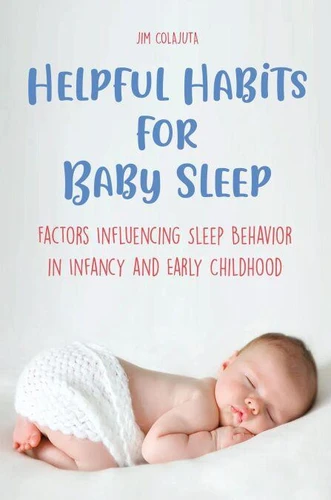Helpful Habits For Baby Sleep Factors Influencing Sleep Behavior in Infancy and Early Childhood
Par :Formats :
Disponible dans votre compte client Decitre ou Furet du Nord dès validation de votre commande. Le format ePub est :
- Compatible avec une lecture sur My Vivlio (smartphone, tablette, ordinateur)
- Compatible avec une lecture sur liseuses Vivlio
- Pour les liseuses autres que Vivlio, vous devez utiliser le logiciel Adobe Digital Edition. Non compatible avec la lecture sur les liseuses Kindle, Remarkable et Sony
 , qui est-ce ?
, qui est-ce ?Notre partenaire de plateforme de lecture numérique où vous retrouverez l'ensemble de vos ebooks gratuitement
Pour en savoir plus sur nos ebooks, consultez notre aide en ligne ici
- FormatePub
- ISBN8201525897
- EAN9798201525897
- Date de parution30/01/2022
- Protection num.pas de protection
- Infos supplémentairesepub
- ÉditeurJL
Résumé
Sleep is a nebulous and ubiquitous concept. It is a behavior that all living animals engage in. It draws a lot of attention in the media and research. Sleep is also a crucial component of a child's healthy development and overall well-being. Infant sleep is perplexing and unpredictable, despite its obvious importance. Caregivers frequently express concerns about adjusting to sleep deprivation and persistent sleep variations.
Most parents find night waking a very disruptive and depressing pattern of behavior that frequently leads them to seek professional advice or turn to a self-help book or friends for help. Sleeping through the night is one of the most important sleep-related ideas and milestones associated with Western industrialized settings. This accomplishment brings many caregivers relief and rejuvenation after weeks or months of sleep deprivation.
In any situation, getting newborns to acquire sleep habits that represent their cultural context is a significant achievement, and strategies for achieving sleep vary greatly depending on cultural standards and beliefs. While there are definite advantages to getting enough sleep as a child, sleep deprivation is tough to handle. When parents thought their infants' sleep was an issue, they had greater levels of overall parenting stress.
Whether actual or perceived, sleep deprivation changed mental well-being and influenced responses to stressful caregiving settings. Sleep is obviously important since it aids in infant growth and development, affects caregivers' overall performance and mental well-being, and affects how new parents view, react to, and interact with their babies.
Most parents find night waking a very disruptive and depressing pattern of behavior that frequently leads them to seek professional advice or turn to a self-help book or friends for help. Sleeping through the night is one of the most important sleep-related ideas and milestones associated with Western industrialized settings. This accomplishment brings many caregivers relief and rejuvenation after weeks or months of sleep deprivation.
In any situation, getting newborns to acquire sleep habits that represent their cultural context is a significant achievement, and strategies for achieving sleep vary greatly depending on cultural standards and beliefs. While there are definite advantages to getting enough sleep as a child, sleep deprivation is tough to handle. When parents thought their infants' sleep was an issue, they had greater levels of overall parenting stress.
Whether actual or perceived, sleep deprivation changed mental well-being and influenced responses to stressful caregiving settings. Sleep is obviously important since it aids in infant growth and development, affects caregivers' overall performance and mental well-being, and affects how new parents view, react to, and interact with their babies.
Sleep is a nebulous and ubiquitous concept. It is a behavior that all living animals engage in. It draws a lot of attention in the media and research. Sleep is also a crucial component of a child's healthy development and overall well-being. Infant sleep is perplexing and unpredictable, despite its obvious importance. Caregivers frequently express concerns about adjusting to sleep deprivation and persistent sleep variations.
Most parents find night waking a very disruptive and depressing pattern of behavior that frequently leads them to seek professional advice or turn to a self-help book or friends for help. Sleeping through the night is one of the most important sleep-related ideas and milestones associated with Western industrialized settings. This accomplishment brings many caregivers relief and rejuvenation after weeks or months of sleep deprivation.
In any situation, getting newborns to acquire sleep habits that represent their cultural context is a significant achievement, and strategies for achieving sleep vary greatly depending on cultural standards and beliefs. While there are definite advantages to getting enough sleep as a child, sleep deprivation is tough to handle. When parents thought their infants' sleep was an issue, they had greater levels of overall parenting stress.
Whether actual or perceived, sleep deprivation changed mental well-being and influenced responses to stressful caregiving settings. Sleep is obviously important since it aids in infant growth and development, affects caregivers' overall performance and mental well-being, and affects how new parents view, react to, and interact with their babies.
Most parents find night waking a very disruptive and depressing pattern of behavior that frequently leads them to seek professional advice or turn to a self-help book or friends for help. Sleeping through the night is one of the most important sleep-related ideas and milestones associated with Western industrialized settings. This accomplishment brings many caregivers relief and rejuvenation after weeks or months of sleep deprivation.
In any situation, getting newborns to acquire sleep habits that represent their cultural context is a significant achievement, and strategies for achieving sleep vary greatly depending on cultural standards and beliefs. While there are definite advantages to getting enough sleep as a child, sleep deprivation is tough to handle. When parents thought their infants' sleep was an issue, they had greater levels of overall parenting stress.
Whether actual or perceived, sleep deprivation changed mental well-being and influenced responses to stressful caregiving settings. Sleep is obviously important since it aids in infant growth and development, affects caregivers' overall performance and mental well-being, and affects how new parents view, react to, and interact with their babies.






















